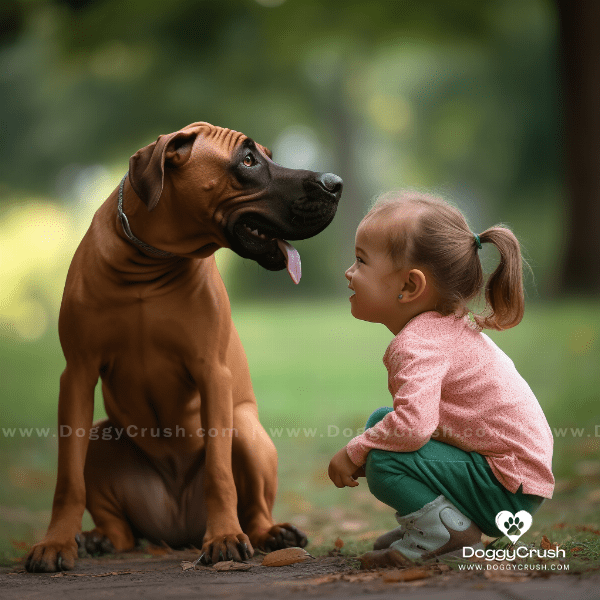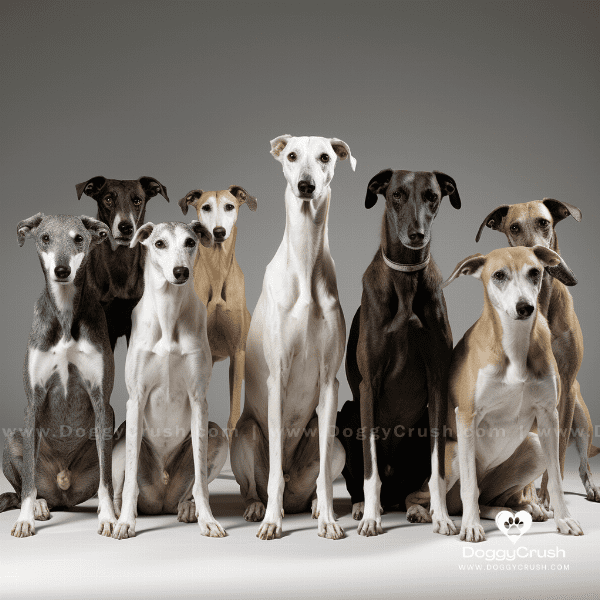Table of Contents
- The Origins of the Rhodesian Ridgeback Breed
- Physical Characteristics of Rhodesian Ridgebacks
- Personality Traits of Rhodesian Ridgebacks
- Rhodesian Ridgebacks in Sports and Competition
- Training and Care for Rhodesian Ridgebacks
- Health Concerns for Rhodesian Ridgebacks
- Rhodesian Ridgebacks as Family Pets
- Rhodesian Ridgeback Rescue and Adoption
- Famous Rhodesian Ridgebacks in History and Pop Culture
- Future of the Rhodesian Ridgeback Breed
The Origins of the Rhodesian Ridgeback Breed
The Rhodesian Ridgeback is a large, muscular dog breed known for the distinctive ridge of hair on its back. But where did this breed originate? Let’s take a look at the fascinating history of the Rhodesian Ridgeback.
Early History
The Rhodesian Ridgeback breed is said to have originated in southern Africa, specifically in what is now known as Zimbabwe (formerly Rhodesia). The breed is a cross between European hunting dogs and indigenous African breeds, specifically the Hottentot dog and the Khoikhoi dog.
The Role of the Ridge
The distinctive ridge of hair on the back of the Rhodesian Ridgeback is due to a genetic mutation that is unique to the breed. However, the purpose of this ridge is still up for debate. Some believe that it helped the breed to blend in with the tall grasses of the African savannah, making them more effective hunters. Others suggest that the ridge may have served as a heat dissipater, allowing the dogs to stay cool in the hot African climate.
Development of the Breed
The Rhodesian Ridgeback breed was developed in the late 19th century by European settlers in Africa who wanted a versatile hunting dog that could handle the harsh African terrain. They crossed various breeds, including the Greyhound, Bloodhound, and Mastiff, with the indigenous African dogs to create a dog that was fast, powerful, and agile.
The Breed’s Name
Originally called the “African Lion Hound,” the breed’s name was changed to Rhodesian Ridgeback in 1922 to reflect its country of origin and the distinctive ridge on its back.
Popularity Today
Today, the Rhodesian Ridgeback is a popular breed around the world, known for its loyalty, strength, and protective nature. They are still used for hunting in some parts of the world, but are more commonly kept as family pets.
In conclusion, the Rhodesian Ridgeback breed has a unique and interesting history that reflects the merging of different cultures and breeds. From its early days as a versatile hunting dog in Africa to its popularity as a beloved pet around the world, the Rhodesian Ridgeback has certainly made its mark on the dog world.
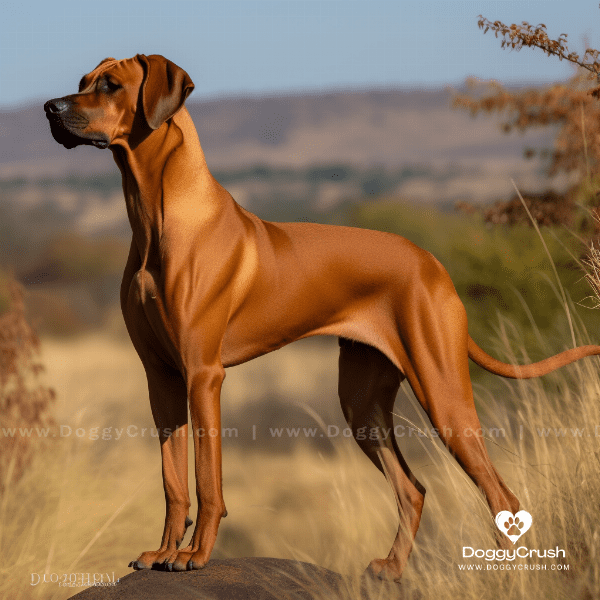
Physical Characteristics of Rhodesian Ridgebacks
The Rhodesian Ridgeback is a powerful and athletic breed, known for its distinctive ridge of hair on its back. Let’s take a closer look at the physical characteristics of this impressive breed.
Size and Build
Rhodesian Ridgebacks are a large breed, standing between 24 and 27 inches tall at the shoulder and weighing between 70 and 85 pounds. They have a muscular and athletic build, with a deep chest, strong legs, and a broad head.
Coat and Color
The Rhodesian Ridgeback has a short and shiny coat that lies close to the body. The coat can range in color from light wheaten to red wheaten, with a black nose and dark eyes. The distinctive ridge of hair on the back is created by a strip of hair growing in the opposite direction from the rest of the coat.
Facial Features
The Rhodesian Ridgeback has a strong and expressive face, with a broad and flat skull and a long, tapered muzzle. They have dark eyes that are set wide apart, giving them an alert and intelligent expression.
Tail
The Rhodesian Ridgeback has a long and muscular tail that is usually carried low when at rest, but can be raised high when the dog is alert or excited.
Gait
The Rhodesian Ridgeback has a smooth and effortless gait, with long, powerful strides that enable them to cover a lot of ground quickly.
In conclusion, the Rhodesian Ridgeback is an impressive breed with a powerful and athletic build. Their short, shiny coat and distinctive ridge of hair on their back make them stand out in a crowd, while their strong and expressive facial features give them an intelligent and alert appearance. The Rhodesian Ridgeback’s smooth and effortless gait makes them a joy to watch in motion.
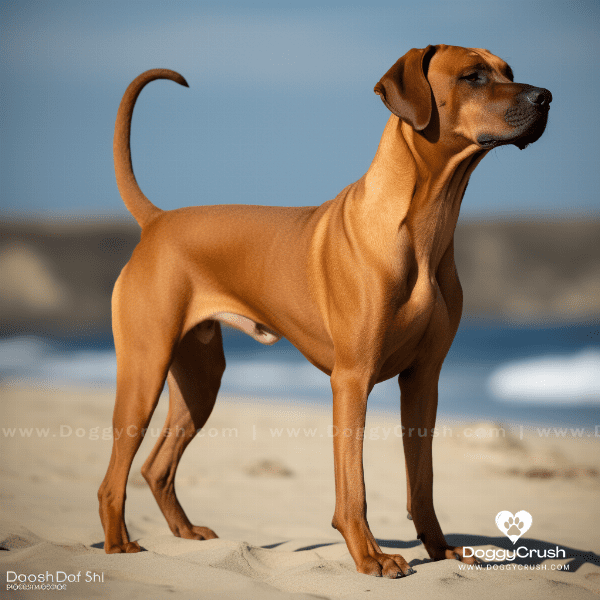
Personality Traits of Rhodesian Ridgebacks
The Rhodesian Ridgeback is known for its loyalty, strength, and protective nature. But what other personality traits can we expect from this breed? Let’s explore some of the key characteristics that make the Rhodesian Ridgeback such a unique and beloved dog.
Independent
One of the defining personality traits of the Rhodesian Ridgeback is its independence. This breed is known for its self-assured and confident nature, and may not always follow commands without question. However, with proper training and socialization, they can become obedient and loyal companions.
Protective
The Rhodesian Ridgeback was originally bred to protect its family and property, and this protective instinct remains strong in the breed today. They can be wary of strangers and are quick to alert their owners of any potential threats. This trait makes them excellent guard dogs, but it also means that they require proper training and socialization to ensure they do not become overly aggressive.
Affectionate
Despite their protective nature, Rhodesian Ridgebacks are also known for their affectionate and loyal personalities. They form strong bonds with their families and thrive on human interaction and attention. They are known to be excellent with children, and their protective nature means they will always keep a watchful eye on their little ones.
Active
The Rhodesian Ridgeback is a high-energy breed that requires regular exercise and mental stimulation. They love to run, play, and explore, and need plenty of opportunities to do so. Regular exercise not only keeps them physically healthy, but also helps to keep their minds sharp and prevent destructive behavior.
Intelligent
Finally, the Rhodesian Ridgeback is a highly intelligent breed that thrives on mental challenges. They are quick learners and enjoy a variety of activities, from obedience training to agility and tracking. Providing regular training and mental stimulation can help to keep them happy and healthy.
In conclusion, the Rhodesian Ridgeback is a unique and beloved breed with a variety of personality traits that make them such great companions. Their independent nature, protective instincts, affectionate personalities, active lifestyles, and intelligence all contribute to their charm and appeal. Proper training and socialization can help to bring out the best in this remarkable breed.
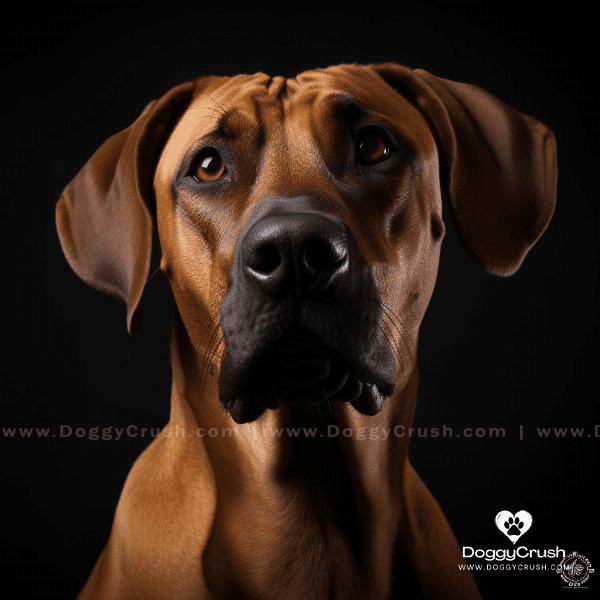
Rhodesian Ridgebacks in Sports and Competition
While the Rhodesian Ridgeback is known for its hunting and protective instincts, it also excels in a variety of sports and competitions. Let’s take a closer look at some of the activities in which this breed can shine.
Lure Coursing
Lure coursing is a sport that involves dogs chasing a mechanically-operated lure across a field. This activity simulates the chase of live prey, and is a great way for Rhodesian Ridgebacks to exercise their natural hunting instincts. The breed’s speed and agility make them excellent at this sport, and many Ridgebacks compete at the highest levels of lure coursing competitions.
Agility
Agility is a sport that involves dogs running through an obstacle course as quickly as possible, with the guidance of their handlers. Rhodesian Ridgebacks are highly athletic dogs that excel at this sport, thanks to their speed, strength, and agility. Many Ridgebacks enjoy the mental and physical challenge of agility, and compete at various levels of competition.
Obedience
Obedience competitions test a dog’s ability to follow commands and perform specific tasks. While the Rhodesian Ridgeback’s independent nature can make obedience training challenging, with proper training and socialization, they can excel in obedience competitions. Many Ridgebacks enjoy the mental stimulation of obedience training, and can earn titles in obedience competition at various levels.
Conformation
Conformation shows are competitions in which dogs are judged on how well they conform to their breed standards. The Rhodesian Ridgeback’s distinctive ridge of hair and muscular build make them a striking and impressive breed in the conformation ring. Many Ridgebacks have earned top honors in conformation shows, showcasing the breed’s unique and appealing characteristics.
Therapy Work
While not a competition, therapy work is an activity in which dogs provide comfort and support to people in hospitals, nursing homes, and other settings. The Rhodesian Ridgeback’s affectionate and loyal nature make them excellent therapy dogs, and many Ridgebacks have brought joy and comfort to countless people through their work as therapy dogs.
In conclusion, the Rhodesian Ridgeback is a versatile breed that excels in a variety of sports and competitions. From lure coursing to agility, obedience, conformation, and therapy work, Ridgebacks have proven themselves to be capable and talented athletes. Engaging in these activities can provide mental and physical stimulation for the breed, while also strengthening the bond between Ridgebacks and their owners.
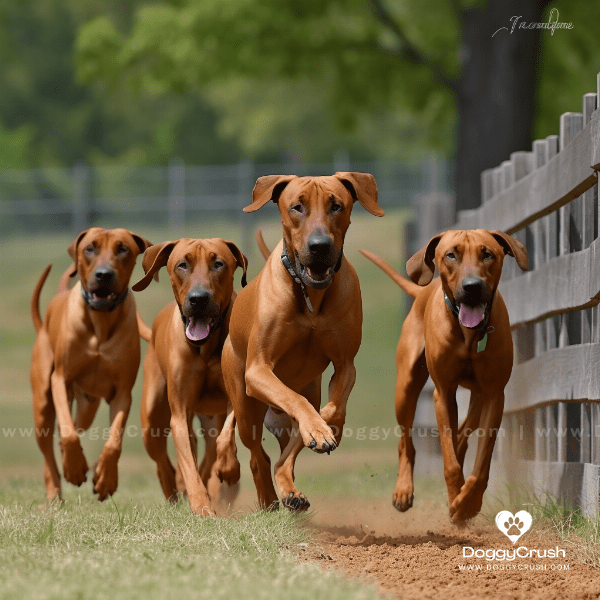
Training and Care for Rhodesian Ridgebacks
Training and care are essential components of responsible dog ownership, and this is especially true for a breed as strong and independent as the Rhodesian Ridgeback. Let’s take a look at some key aspects of training and care for this breed.
Training
Training is essential for a Rhodesian Ridgeback to become a well-behaved and obedient companion. However, Ridgebacks can be independent and strong-willed, making training a challenge. Positive reinforcement training methods, such as rewarding good behavior with treats and praise, can be effective in training this breed. Consistency and patience are also key, as is early socialization to help Ridgebacks develop good behavior around people and other animals.
Exercise
Rhodesian Ridgebacks are a high-energy breed that require regular exercise to stay healthy and happy. Daily walks, runs, or hikes, as well as plenty of playtime, can help to keep them physically and mentally stimulated. Failure to provide adequate exercise can lead to destructive behavior, obesity, and other health problems.
Grooming
The Rhodesian Ridgeback’s short, shiny coat is relatively easy to maintain, requiring only occasional brushing to remove loose hair and keep the coat looking healthy. Bathing should be done only as needed, as frequent bathing can strip the coat of its natural oils. Regular nail trimming, ear cleaning, and dental care are also important components of grooming for this breed.
Health
Like all breeds, the Rhodesian Ridgeback is susceptible to certain health problems. Some of the most common health concerns for this breed include hip dysplasia, elbow dysplasia, bloat, and skin issues. Regular visits to the veterinarian, proper nutrition, and exercise can help to prevent or manage many of these health issues. It is also important to purchase a Ridgeback from a reputable breeder who screens for genetic health problems.
Socialization
Proper socialization is essential for Rhodesian Ridgebacks to develop good behavior around people and other animals. Early and ongoing socialization can help Ridgebacks to become confident, well-adjusted companions. This can include exposure to a variety of people, animals, and environments, as well as positive experiences with new things.
In conclusion, training and care are important components of responsible ownership for the Rhodesian Ridgeback breed. With proper training, exercise, grooming, health care, and socialization, Ridgebacks can become loyal, well-behaved, and happy companions.
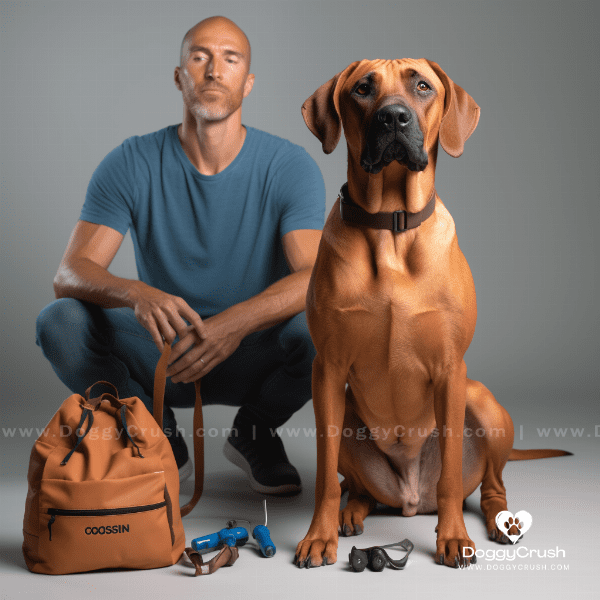
Health Concerns for Rhodesian Ridgebacks
As with all Dog breeds, the Rhodesian Ridgeback is susceptible to certain health issues. It is important for owners to be aware of these concerns so that they can take steps to prevent or manage them. Let’s take a closer look at some of the most common health concerns for the Rhodesian Ridgeback.
Hip Dysplasia
Hip dysplasia is a condition in which the hip joint doesn’t develop properly, leading to arthritis and pain. This is a common condition in large breed dogs, including the Rhodesian Ridgeback. Hip dysplasia can be managed with medication, weight management, and exercise, and may require surgery in severe cases.
Elbow Dysplasia
Elbow dysplasia is similar to hip dysplasia, but affects the elbow joint. It can cause pain, lameness, and arthritis, and is common in large breed dogs like the Rhodesian Ridgeback. Treatment options include medication, weight management, and surgery.
Bloat
Bloat, also known as gastric torsion or twisted stomach, is a life-threatening condition in which the stomach fills with gas and twists on itself. This can lead to a decrease in blood flow to the stomach and other organs, and can be fatal if not treated quickly. Prevention measures include feeding multiple small meals throughout the day instead of one large meal, and avoiding exercise immediately after eating.
Skin Issues
Rhodesian Ridgebacks are prone to skin issues, including allergies and bacterial infections. Symptoms may include itching, redness, and hot spots. Treatment may involve medication, dietary changes, and topical treatments.
Cancer
Cancer is a concern for all dog breeds, and the Rhodesian Ridgeback is no exception. This breed is particularly susceptible to a type of cancer called histiocytic sarcoma, which can affect multiple organs and has a poor prognosis. Early detection and treatment are important in managing cancer in dogs.
In conclusion, the Rhodesian Ridgeback is susceptible to several health concerns, including hip dysplasia, elbow dysplasia, bloat, skin issues, and cancer. It is important for owners to be aware of these concerns and to take steps to prevent or manage them, such as proper nutrition, exercise, and regular visits to the veterinarian. With proper care, Ridgebacks can live long and healthy lives.
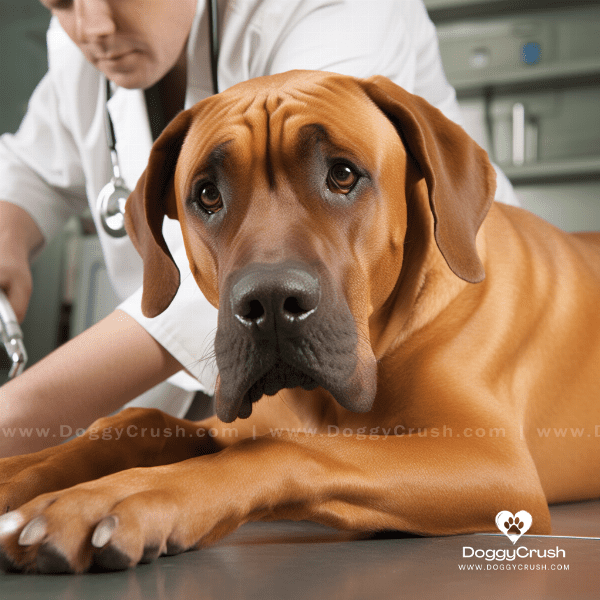
Rhodesian Ridgebacks as Family Pets
The Rhodesian Ridgeback is a unique and fascinating breed that can make a wonderful addition to a family. Let’s explore some of the reasons why Rhodesian Ridgebacks can be excellent family pets.
Loyalty
Rhodesian Ridgebacks are known for their loyalty to their families. They form strong bonds with their owners and will do anything to protect them. This makes them excellent watch dogs and guard dogs, but it also means that they are fiercely loyal and affectionate with their loved ones.
Gentle with Children
Rhodesian Ridgebacks can be gentle and patient with children, making them excellent family pets. However, it is important to supervise interactions between young children and dogs, as even the most patient dog can become irritated if provoked or mishandled.
Active Lifestyle
Rhodesian Ridgebacks are a high-energy breed that requires regular exercise and mental stimulation. This can be a great motivation for families to engage in outdoor activities and spend time together. The breed’s love for running, hiking, and exploring can make them a great companion for active families.
Protective Instincts
The Rhodesian Ridgeback’s protective instincts can make them an excellent watchdog for families. They will alert their owners to potential threats and will do whatever it takes to protect their loved ones. However, it is important to socialize and train Ridgebacks to prevent them from becoming overly aggressive or territorial.
Low-Maintenance Coat
The Rhodesian Ridgeback’s short, shiny coat is relatively low-maintenance, requiring only occasional brushing and grooming. This can be a great advantage for families who don’t have a lot of time for extensive grooming.
In conclusion, the Rhodesian Ridgeback can make an excellent family pet for the right family. Their loyalty, gentleness with children, active lifestyle, protective instincts, and low-maintenance coat can make them a great addition to a family. However, it is important to remember that Ridgebacks require proper training, socialization, and exercise to thrive as family pets. With the right care and attention, a Rhodesian Ridgeback can be a loving and loyal companion for many years to come.
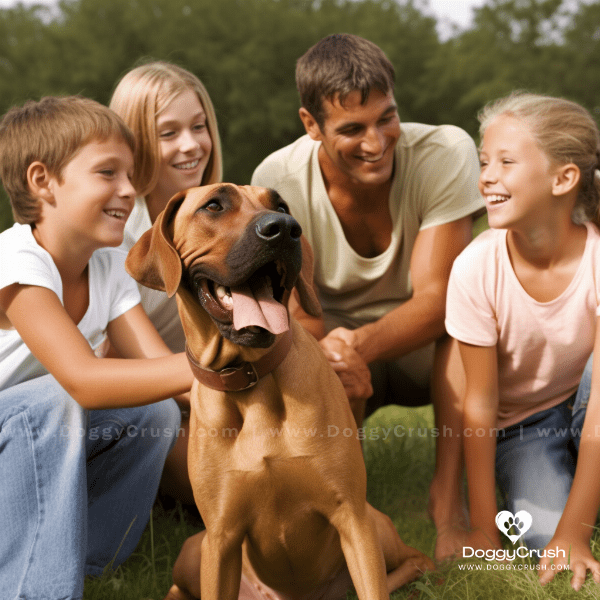
Rhodesian Ridgeback Rescue and Adoption
Rhodesian Ridgebacks can make wonderful companions, but unfortunately, not all of them find loving forever homes. If you are considering adopting a Rhodesian Ridgeback, here are some things you should know.
Why Adopt a Rhodesian Ridgeback
There are many reasons why adopting a Rhodesian Ridgeback can be a great choice. Adopting a rescue dog can be a rewarding experience, as you are giving a dog a second chance at a happy life. Adopted dogs often show immense gratitude and loyalty to their new families. Adopting a Ridgeback can also be a great choice for families who are looking for an active, intelligent, and loyal companion.
Where to Find Rhodesian Ridgeback Rescue Organizations
There are many Rhodesian Ridgeback rescue organizations throughout the world. These organizations rescue and rehabilitate Ridgebacks who have been surrendered or abandoned, and work to find them loving forever homes. Some well-known rescue organizations include Rhodesian Ridgeback Rescue, Inc., Rhodesian Ridgeback Rescue of Northern California, and Rhodesian Ridgeback Rescue, Inc. (UK). You can also check with local animal shelters and rescue groups in your area to see if they have any Ridgebacks available for adoption.
What to Expect when Adopting a Rhodesian Ridgeback
When adopting a Rhodesian Ridgeback, you can expect to go through an adoption process that may involve an application, home visit, and possibly a fee. This is to ensure that the dog is going to a suitable and loving home. Adopted dogs may also come with some training or behavior issues that will require patience and consistency in training. However, with love and patience, adopted Ridgebacks can make wonderful and loyal companions.
How to Prepare for Adopting a Rhodesian Ridgeback
Before adopting a Rhodesian Ridgeback, it is important to prepare your home and family for the new addition. This may include purchasing supplies such as food, bowls, and a crate, as well as preparing a safe and comfortable living space for the dog. It is also important to research the breed and learn about their specific needs and behaviors. Proper training and socialization are essential for any dog, but especially for rescued dogs who may have had traumatic experiences in the past.
In conclusion, adopting a Rhodesian Ridgeback can be a rewarding experience for both the dog and the family. With proper preparation, patience, and love, adopted Ridgebacks can make wonderful and loyal companions. If you are considering adopting a Rhodesian Ridgeback, reach out to a reputable rescue organization or shelter to learn more about the adoption process and available dogs.
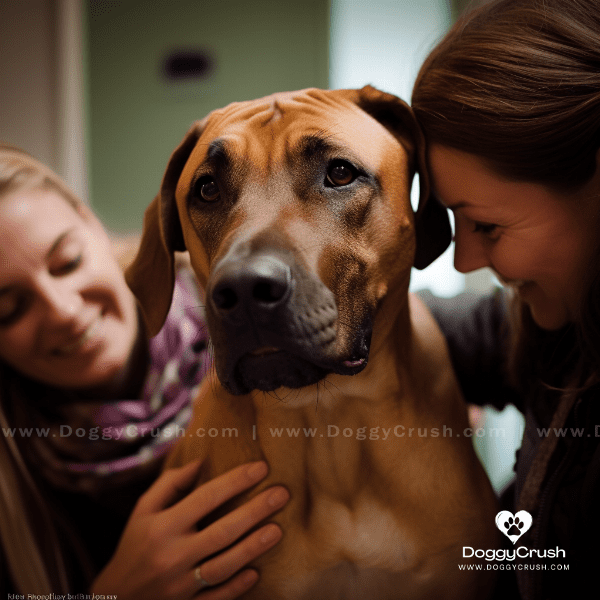
Famous Rhodesian Ridgebacks in History and Pop Culture
The Rhodesian Ridgeback is a breed that has captured the hearts of many, including famous individuals and pop culture icons. Let’s take a look at some famous Rhodesian Ridgebacks throughout history and pop culture.
Cinnamon
Cinnamon was a Rhodesian Ridgeback owned by US President Herbert Hoover. Cinnamon was known for her loyal and gentle nature, and she would often accompany President Hoover on walks around the White House grounds.
Zeus
Zeus was a Rhodesian Ridgeback owned by actor Will Smith. Zeus was known for his size and strength, and would often accompany Smith to film sets and events.
Pearl
Pearl was a Rhodesian Ridgeback owned by actress Brooke Shields. Pearl was a beloved companion and often accompanied Shields to red carpet events.
Harvey
Harvey was a Rhodesian Ridgeback owned by British singer Adele. Harvey was often featured in Adele’s social media posts and was known for his friendly and playful nature.
Ridgebacks in Pop Culture
Rhodesian Ridgebacks have also made appearances in popular culture, such as in the movie “Goodbye, My Lady” and the television series “The West Wing”. The breed’s unique appearance and loyal nature have made them a favorite among dog enthusiasts and pop culture fans alike.
In conclusion, the Rhodesian Ridgeback has captured the hearts of many throughout history and pop culture. From presidential pets to celebrity companions, this breed has made a lasting impression on many. Their loyal nature and striking appearance continue to make them a popular choice among dog lovers around the world.
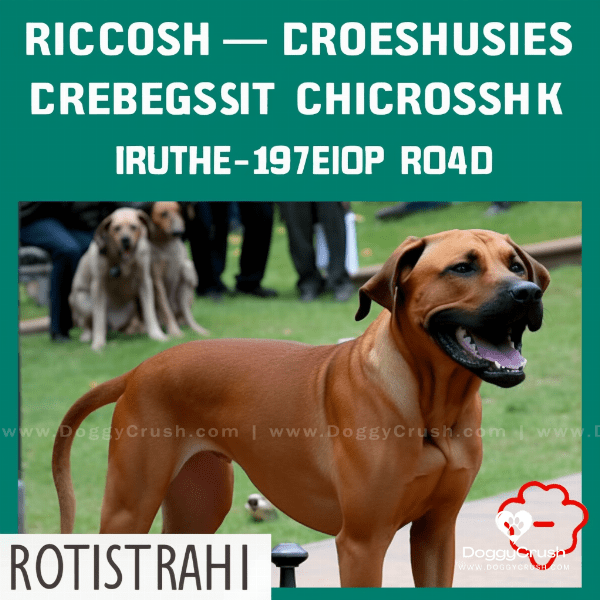
Future of the Rhodesian Ridgeback Breed
As with all dog breeds, the future of the Rhodesian Ridgeback is shaped by a variety of factors. Let’s take a look at some of the potential challenges and opportunities facing this breed in the future.
Health Concerns
One of the biggest challenges facing the Rhodesian Ridgeback breed is the prevalence of certain health issues, such as hip dysplasia and cancer. While responsible breeding practices and proper care can help to prevent and manage these issues, it is important for breeders and owners to remain vigilant and proactive in addressing them.
Popularity
The popularity of the Rhodesian Ridgeback breed has fluctuated over the years, with some periods seeing a surge in demand and others seeing a decline. It is important for breeders and owners to ensure that the breed remains a responsible and ethical choice for those seeking a new companion.
Breed Standards
Breed standards for the Rhodesian Ridgeback have evolved over time, with some controversy surrounding certain changes. It is important for breeders and owners to carefully consider the impact of changes to breed standards, and to prioritize the health and well-being of the dogs above all else.
Responsible Ownership
Perhaps the most important factor in the future of the Rhodesian Ridgeback breed is responsible ownership. Proper training, socialization, and care are essential for ensuring that Ridgebacks remain healthy, happy, and well-behaved companions. It is also important for owners to be aware of the breed’s unique characteristics and needs, and to ensure that they are able to provide a suitable environment and lifestyle for their Ridgeback.
In conclusion, the future of the Rhodesian Ridgeback breed will depend on a variety of factors, including health concerns, popularity, breed standards, and responsible ownership. By remaining vigilant and proactive in addressing these factors, breeders and owners can help to ensure that the Rhodesian Ridgeback remains a healthy, happy, and beloved breed for years to come.
